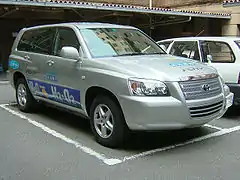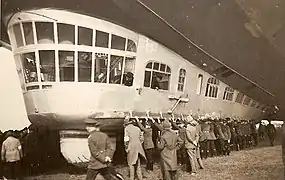car
English
Pronunciation
Etymology 1
From Middle English carre, a borrowing from Anglo-Norman carre (from Old Northern French, compare Old French char), from Latin carra, neuter plural of carrus (“four-wheeled baggage wagon”), from Gaulish *karros, from Proto-Celtic *karros (“wagon”), from Proto-Indo-European *ḱr̥sós, zero-grade form of *ḱers- (“to run”).
Noun
car (plural cars)
- A wheeled vehicle that moves independently, with at least three wheels, powered mechanically, steered by a driver and mostly for personal transportation; a motorcar or automobile.
- She drove her car to the mall.
- 2005, Jordan Houston, Darnell Carlton, Paul Beauregard, Premro Smith, Marlon Goodwin, David Brown, and Willie Hutchinson (lyrics), “Stay Fly”, in Most Known Unknown, Sony BMG, performed by Three 6 Mafia (featuring Young Buck, 8 Ball, and MJG):
- I'm a stunt; ride in the car with some bump in the trunk.
- 2006, Edwin Black, chapter 1, in Internal Combustion:
- If successful, Edison and Ford—in 1914—would move society away from the ever more expensive and then universally known killing hazards of gasoline cars: […] .
- (dated) A wheeled vehicle, drawn by a horse or other animal; a chariot.
- 1594, Christopher Marlowe, Edward II, London: William Jones,
- It shall suffice me to enioy your loue,
- Which whiles I haue, I thinke my selfe as great,
- As Caesar riding in the Romaine streete,
- With captiue kings at his triumphant Carre.
- c. 1606, William Shakespeare, Antony and Cleopatra, Act IV, Scene 8,
- He has deserved it [armour], were it carbuncled
- Like holy Phoebus’ car.
- (Britain, Birmingham, obsolete) A four-wheeled cab, as opposed to a (two-wheeled) Hansom cab.
- 1594, Christopher Marlowe, Edward II, London: William Jones,
- (rail transport, chiefly Canada, US) An unpowered unit in a railroad train.
- The conductor coupled the cars to the locomotive.
- (rail transport) an individual vehicle, powered or unpowered, in a multiple unit.
- The 11:10 to London was operated by a 4-car diesel multiple unit.
- (rail transport) A passenger-carrying unit in a subway or elevated train, whether powered or not.
- From the frontmost car of the subway, he filmed the progress through the tunnel.
- A rough unit of quantity approximating the amount which would fill a railroad car.
- We ordered five hundred cars of gypsum.
- The moving, load-carrying component of an elevator or other cable-drawn transport mechanism.
- Fix the car of the express elevator - the door is sticking.
- The passenger-carrying portion of certain amusement park rides, such as Ferris wheels.
- The most exciting part of riding a Ferris wheel is when your car goes over the top.
- The part of an airship, such as a balloon or dirigible, which houses the passengers and control apparatus.
- 1850, John Wise, A System of Aeronautics, page 152:
- Everything being apparently in readiness now, I stepped into the car of the balloon, […]
-
- (sailing) A sliding fitting that runs along a track.
- (uncountable, US, slang) The aggregate of desirable characteristics of a car.
- Buy now! You can get more car for your money.
- (US) A floating perforated box for living fish.
Synonyms
- (private vehicle that moves independently): auto, motorcar, vehicle; automobile (US), motor (British colloquial), carriage (obsolete)
- (non-powered part of a train): railcar, wagon
- (unit of quantity): carload, wagonload
- (passenger-carrying light rail unit): carriage
- (part of an airship): gondola, basket (balloons only)
- See also Thesaurus:automobile
Derived terms
- boxcar
- buffet car
- cable car
- car alarm
- car barn
- car carrier
- car chase
- carfare
- car ferry
- car-free, carfree
- car lot
- carman
- carpark, car park
- car phone
- car rental
- car transporter
- carwash
- cattle car
- clown car
- concept car
- dining car
- dynamometer car
- electric car
- family car
- flatcar
- freight car
- getaway car
- hopper car
- mail car
- observation car
- pedal car
- police car
- racecar, racing car
- railcar
- railroad car
- rental car
- restaurant car
- solar car
- sports car
- squad car
- veteran car
- vintage car
- well car
Translations
|
|
|
|
- The translations below need to be checked and inserted above into the appropriate translation tables, removing any numbers. Numbers do not necessarily match those in definitions. See instructions at Wiktionary:Entry layout#Translations.
|
|
Etymology 2
Etymology unclear, but probably from Proto-Germanic *karzijaną (“to turn”), from Proto-Indo-European *gers- (“to bend, turn”). See also cair (“to turn, go”), char (“a turn; a task (a turn of work); to turn; to cause to turn”), Dutch keren (“to turn, change direction”) and German Kehre (“a turn, change of direction; a U-turn, bend”). Shakespeare had something of a fondness for verbalizing nouns, and sometimes even substantivizing verbs. However, anything other than a "turn" does not seem to make any sense within the broader context of the cited Sonnet.
Noun
car (plural cars)
- (obsolete) A turn.
- 1609 William Shakespeare, Sonnet 7,
- But when from highmost pitch, with weary car,
- Like feeble age, he reeleth from the day, (after the sun reaches the zenith it, with a weary turn, begins to reel (“to roll”) (downwards))
- 1609 William Shakespeare, Sonnet 7,
Etymology 3
Acronym of contents of the address part of register number. Note that it was based on original hardware and has no meaning today.
Noun
car (plural cars)
- (computing) The first part of a cons in LISP. The first element of a list
- Matt Kaufmann, Panagiotis Manolios, and J Strother Moore, Computer-aided reasoning: an approach, 2000 :
- The elements of a list are the successive cars along the "cdr chain." That is, the elements are the car, the car of the cdr, the car of the cdr of the cdr, etc.
- Matt Kaufmann, Panagiotis Manolios, and J Strother Moore, Computer-aided reasoning: an approach, 2000 :
Antonyms
Gallery
 A hydrogen-powered car.
A hydrogen-powered car. Freight cars.
Freight cars. A self-propelled passenger car.
A self-propelled passenger car. Ferris wheel cars.
Ferris wheel cars..jpg.webp) Car on a sailboat.
Car on a sailboat. Car of a Zeppelin.
Car of a Zeppelin. Elevator cars.
Elevator cars.
Aromanian
Alternative forms
Aynu
Catalan
Czech
Etymology
From Old Church Slavonic цѣсарь (cěsarĭ), from Proto-Slavic *cěsarjь, from a Germanic language, from Proto-Germanic *kaisaraz, from Latin Caesar.
Pronunciation
- IPA(key): /tsar/
- Rhymes: -ar
French
Pronunciation
- IPA(key): /kaʁ/
audio (file) - Rhymes: -aʁ
Etymology 1
From Old French quer (“as, since, because, for”), from Latin quārē (“how; why”).
Conjunction
car
Synonyms
- parce que (in some contexts)
Etymology 2
Borrowed from English car, itself borrowed from Anglo-Norman and the Old Northern French car, variant of Old French char. Doublet of char.
Noun
car m (plural cars)
Synonyms
Anagrams
Further reading
- “car” in le Trésor de la langue française informatisé (The Digitized Treasury of the French Language).
Interlingua
Irish
Etymology
From Old Irish caraid, from Proto-Celtic *kareti (“to love”), from Proto-Indo-European *keh₂- (“to desire, wish”).
Pronunciation
- IPA(key): /karˠ/
Verb
car (present analytic carann, future analytic carfaidh, verbal noun carthain, past participle cartha)
Conjugation
| singular | plural | relative | autonomous | ||||||
|---|---|---|---|---|---|---|---|---|---|
| first | second | third | first | second | third | ||||
| indicative | present | caraim | carann tú; carair† |
carann sé, sí | caraimid | carann sibh | carann siad; caraid† |
a charann; a charas / a gcarann*; a gcaras* |
cartar |
| past | char mé; charas | char tú; charais | char sé, sí | charamar; char muid | char sibh; charabhair | char siad; charadar | a char / ar char* |
caradh | |
| past habitual | charainn | chartá | charadh sé, sí | charaimis; charadh muid | charadh sibh | charaidís; charadh siad | a charadh / ar charadh* |
chartaí | |
| future | carfaidh mé; carfad |
carfaidh tú; carfair† |
carfaidh sé, sí | carfaimid; carfaidh muid |
carfaidh sibh | carfaidh siad; carfaid† |
a charfaidh; a charfas / a gcarfaidh*; a gcarfas* |
carfar | |
| conditional | charfainn / gcarfainn‡‡ | charfá / gcarfᇇ | charfadh sé, sí / gcarfadh sé, s퇇 | charfaimis; charfadh muid / gcarfaimis‡‡; gcarfadh muid‡‡ | charfadh sibh / gcarfadh sibh‡‡ | charfaidís; charfadh siad / gcarfaidís‡‡; gcarfadh siad‡‡ | a charfadh / ar charfadh* |
charfaí / gcarfa퇇 | |
| subjunctive | present | go gcara mé; go gcarad† |
go gcara tú; go gcarair† |
go gcara sé, sí | go gcaraimid; go gcara muid |
go gcara sibh | go gcara siad; go gcaraid† |
— | go gcartar |
| past | dá gcarainn | dá gcartá | dá gcaradh sé, sí | dá gcaraimis; dá gcaradh muid |
dá gcaradh sibh | dá gcaraidís; dá gcaradh siad |
— | dá gcartaí | |
| imperative | caraim | car | caradh sé, sí | caraimis | caraigí; caraidh† |
caraidís | — | cartar | |
| verbal noun | carthain | ||||||||
| past participle | cartha | ||||||||
* Indirect relative
† Archaic or dialect form
‡‡ Dependent form used with particles that trigger eclipsis
Mutation
| Irish mutation | ||
|---|---|---|
| Radical | Lenition | Eclipsis |
| car | char | gcar |
| Note: Some of these forms may be hypothetical. Not every possible mutated form of every word actually occurs. | ||
Occitan
Etymology
From Old Occitan [Term?], from Latin cārus.
Polish
Etymology
From Proto-Slavic *cěsarjь, from a Germanic language, from Proto-Germanic *kaisaraz, from Latin Caesar.
Pronunciation
- IPA(key): /t͡sar/
audio (file)
Declension
Derived terms
- caryca
- carewicz
- carówna
Scottish Gaelic
Derived terms
Adverb
car
Serbo-Croatian
Etymology
From Proto-Slavic *cěsarь, *cьsarь, from a Germanic language, from Proto-Germanic *kaisaraz, from Latin Caesar.
Pronunciation
- IPA(key): /tsâr/
Noun
cȁr m (Cyrillic spelling ца̏р)
Declension
Slovene
Etymology
From Serbo-Croatian cȁr, from Proto-Slavic *cěsarjь, from a Germanic language, from Proto-Germanic *kaisaraz, from Latin Caesar.
Pronunciation
- IPA(key): /ˈtsàːr/, /ˈtsáːr/
- Tonal orthography: cár, cȃr
Declension
| singular | dual | plural | |
|---|---|---|---|
| nominative | cár | cárja | cárji |
| accusative | cár | cárja | cárje |
| genitive | cárja | cárjev | cárjev |
| dative | cárju | cárjema | cárjem |
| locative | cárju | cárjih | cárjih |
| instrumental | cárjem | cárjema | cárji |
Volapük
Pronunciation
- IPA(key): [tʃar]
Welsh
Etymology
From Middle Welsh carr, from Proto-Brythonic *karr, from Proto-Celtic *karros.
Pronunciation
- IPA(key): /kar/
